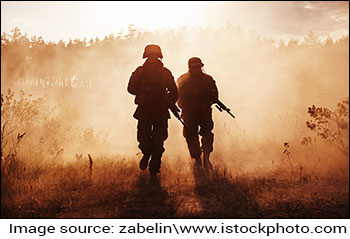- Home
- Views On News
- Apr 11, 2022 - The Russia-Ukraine War: Lessons for Indian Investors
The Russia-Ukraine War: Lessons for Indian Investors

Russia's military operation in Ukraine started on 24 February. Ever since then, financial markets around the world have been on tenterhooks.
Markets don't like uncertainty. And the war in Ukraine has caused a lot of it. This lead to an unprecedented amount of volatility in the Indian stock market.
The Nifty took a tumble by about 7%.
However, things have changed since then. The stock market bounced back quite strongly. Although the Nifty hasn't made a new life high by the last week of March 2022, it has been extremely resilient.
In fact, some commodity stocks like Hindalco and ONGC have delivered positive returns this year.
This raises a question: What do we learn from this episode in the market?
The answer has a few parts. Let's look at them one at a time...
# No one can predict the market
There was talk of a bear market when the war began.
Many so called market 'experts' thought a long war, along with massive sanctions on Russia, would disrupt commodity markets. This in turn would send inflation higher which would hit consumption around the world.
Lower consumption would mean lower revenues for companies. Lower revenues combined with rising costs would lead to a sharp drop in profit. The markets would have to price that in and so lower stock prices were to be expected. At least that was the prediction.
Well a lot of their predictions came true except for the one that mattered. Stock prices have recovered to a large extent after a brief fall.
This has happened despite the war dragging on, massive sanctions imposed on Russia, disruptions in commodity markets, crude oil rising above US$ 100, and higher inflation.
Also, the US Fed began its rate hike cycle letting everyone know that it's now fully focused on fighting inflation above all else.
There are other concerns too like a re-alignment in geo-politics, rising tensions in the middle-east, an increasingly belligerent North Korea, and a new coronavirus outbreak in China which has been spreading around the world.
When the war began, no one predicted the markets would recover so quickly.
Yet it did.
This should give us pause.
An important lesson we can learn as investors is this: No one can tell you how the market will move. Don't listen to anyone who says they can predict the market.
# Stocks can go up when the market is down
In the first week of March, the Nifty was down 14% from its all-time high. A fall greater than 20% would be called a bear market.
In such a scenario, it was natural to assume that most stocks, if not all, would be down too.
And that assumption was correct to a large extent. Many stocks, especially midcaps and smallcaps, were down over 50%.
But it wasn't true universally.
There are stocks that are up more than 10% this year even though the market sentiment has been mostly bearish.
In fact some stocks like Hindalco are up more than 20% in 2022. Others are flat. Still others are down only marginally.
Then there are stocks of certain sectors that have done very well. Sugar stocks come to mind.
Balrampur Chini and Triveni Engineering are up 30% and 45% this year. These are staggering gains in a falling market.
What's the lesson here?
There will always be pockets of bullishness in any bearish phase. These stocks can be very profitable. You should look for them.
# Long-Term Trends
No matter what happens in the short-term, there will be long-term effects of this war.
Here are some of them...
- Higher levels of inflation will persist for a while, likely beyond 2022.
- Supply shortages of various commodities will become a regular occurrence. Every country will need to be prepared for it.
- The low interest rate era which began during the global financial crisis of 2008, is now finally over. Interest rates will go higher over the coming years.
- Certain sectors - defence AI, 5G, fintech, Internet of Things - will do well. Sectors relying on consumption may struggle.
# The most obvious long-term winner may be defence stocks
Defence stocks may not have set the market on fire recently but they are strong candidates for long-term wealth creation.
The government's push for self-reliance will be a massive tailwind for these stocks. Many defence-related companies will likely pop up over the next few years. These businesses will cater to new ideas that the market is probably not even aware of.
The long-term prospects of this sector are bright. But picking the right stocks will be a challenge.


Equitymaster requests your view! Post a comment on "The Russia-Ukraine War: Lessons for Indian Investors". Click here!
Comments are moderated by Equitymaster, in accordance with the Terms of Use, and may not appear
on this article until they have been reviewed and deemed appropriate for posting.
In the meantime, you may want to share this article with your friends!